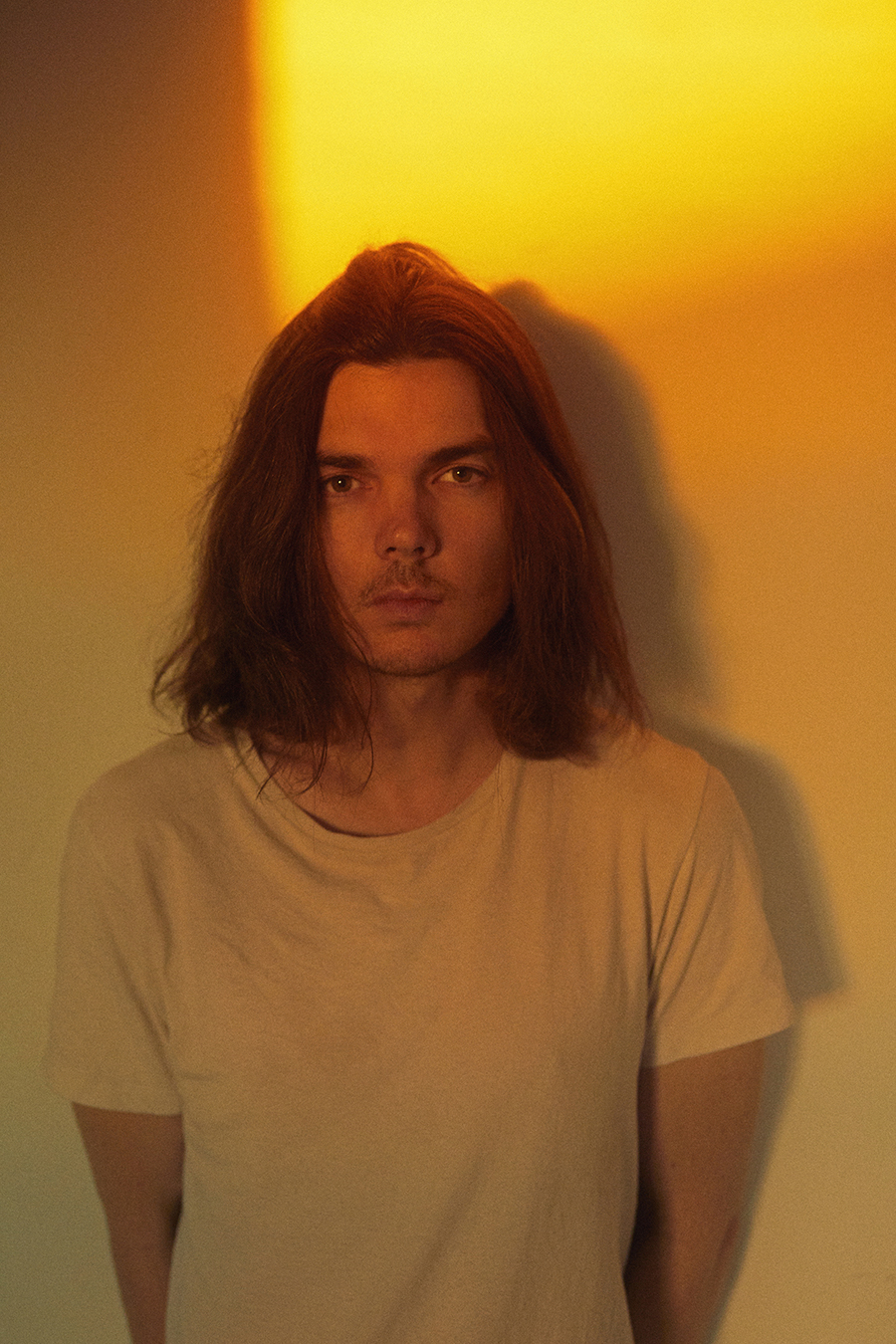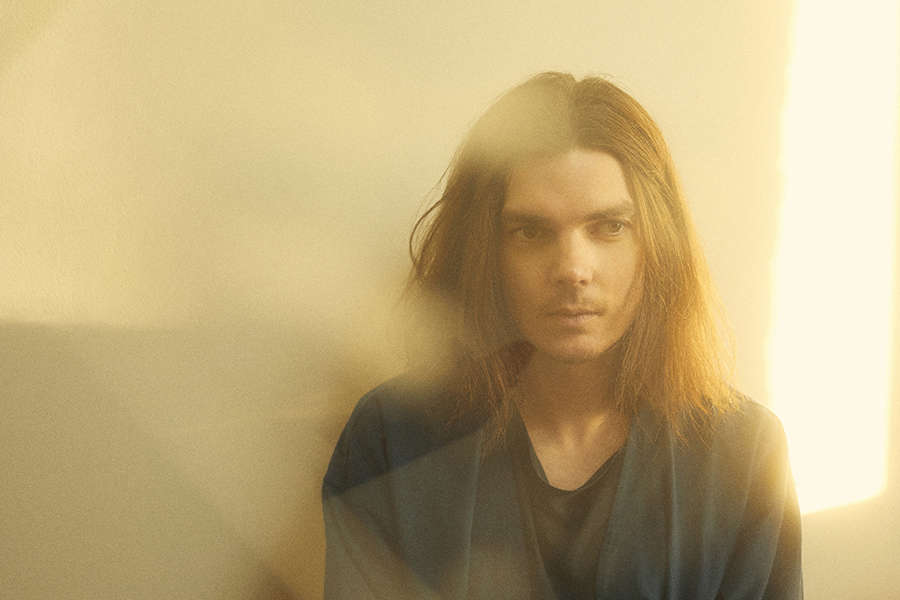If you were to blend a love of ‘60s and ‘70s European film, 20th-century classical minimalism, with a dash of Japanese new age, how would it combine? If you dared to melt nature onto walls of synth, sifting through the remains to find reflections on love, life, and aspiration, how would it sound? Welcome to the soft intricacies of unfolding, the debut EP from Australian producer bambi.
In the simplest terms, Dominic Simper is an artist crafting universes of experience onto sheets of melody. A seemingly impossible task, his ability to conjure fleeting moments through solitary notes is a genius most artists only dream to unlock. unfolding is not so much a record as it is a Louvre of fragile tones, each ready to unravel at any moment.
He casts sonic into a realm where our senses lay as colours on a textured canvas, where moments as delicate as a change in afternoon light or the soft fall of snow seen from a warm bed can be painted on walls of synth. Fresh off the press, we caught up with Simper himself to chat through his process, inspirations, and the immaculate reflection that is unfolding.

HAPPY: Hey Dominic, how’s it going?
DOMINIC: Not too bad, I’m at the beach now.
HAPPY: Oh, I’m so jealous!
DOMINIC: Yeah, I’m gonna be on the phone, I kind of have to be on my feet. I can’t really sit still.
HAPPY: [Laughs] Congrats on the new EP!
DOMINIC: Oh, thank you!
HAPPY: How does it feel to have it all finally finished?
DOMINIC: A bit surreal. I recorded it in the second half of 2018, so quite a while ago. I’m in a completely different space, so it’s strange to be kind of revisiting that period.
HAPPY: Yeah for sure. Why the decision to release it now?
DOMINIC: Kind of a combination of things. Part of it was just building up the courage and deciding to put it out and into the world. Then last year was pretty busy playing for Tame as well. I also moved back to Australia after a few years, so I just had a few things going on.
HAPPY: Yeah, for sure. The premise behind what we hear on the EP sounds so intricate. Could you break down the concept behind unfolding for us?
DOMINIC: Yeah, it really sticks with kind of environmental music, like the idea that music can play a big part in creating a cohesive moment or space. In a perfect environment where all the senses kind of synergize to create this feeling or emotion, I like the idea that music can play a big part in that.
HAPPY: Is nature and your surroundings a particular artistic influence for you?
DOMINIC: Definitely. I try to go for a walk every morning and, you know, go out for a hike on the weekend. It’s really a big part of staying sane for me I think.
HAPPY: You’ve said that you’ve lived all around the world, have been in these different places affected your music-making?
DOMINIC: Definitely. They’ve all inspired me so much, just other music that is also colour palettes and shapes and architecture, you know, just the different life that you get over in Europe, compared to Australia. The cover is kind of inspired by the soft morning below the covers, kind of around wintertime in Europe, and it’s just like nothing you get over here.
HAPPY: Yeah, absolutely. Whereabouts were you living?
DOMINIC: In Amsterdam over in the Netherlands.
HAPPY: Oh, nice. Yeah, that would have been so good for sources of inspiration.
DOMINIC: Yeah, it’s such a magical place.
HAPPY: A lot of what we’ve been hearing about the album is how it has this really cinematic quality and I’ve even heard some people refer to it as a sculpture, is there a particular way that you perceive the album to be?
DOMINIC: I like that idea. I don’t really think of them as being songs in the way that we generally talk about songs. I think I’m very inspired by a lot of film composers, especially from the ’60s and ’70s European cinema. I love the kind of saturated, emotional nostalgia that those particular string sounds have and the melodies. I think, eventually, I want to start heading in that direction, working for soundtracking.

HAPPY: You’ve also said that you’ve taken notes from some really beautiful influences, like European cinema and Japanese new age was one that you mentioned. What’s the catalyst for you when choosing a stylistic direction?
DOMINIC: It’s something that you can’t really rationalise, it’s just what captures your imagination. It’s just something that really resonates with you and I feel like you have to stay in tune with that feeling and just do it to make something that’s authentic or honest. It’s like you don’t really get a say in what you fall in love with or what captures you. I’ve kind of taken that approach of just following that path wherever it goes. You don’t really know… you know, when I started recording I didn’t really know what I was aiming for, but it’s just kind of what eventuated over the course of doing it.
HAPPY: Yeah, absolutely. Well, you’ve honed in a really strong sonic aesthetic on this record. What got you into working with sound?
DOMINIC: Well, I’ve been a musician, obviously, for my whole career, so I picked up a lot from that experience. It’s a similar thing, some sounds just capture you and I love the idea of taking electronic instruments and making them sound organic or sounding like they’re a real thing. Trying to make them breathe and bring them to life.
HAPPY: Is there one of your tracks that you had a particular challenge making that happen on?
DOMINIC: I really want to do the last one first on the album because that’s probably the most obviously programmatic piece, in that it’s really just supposed to evoke this sense of staring out a window while the snow starts falling. I wanted to make sure that it captured all the right notes and I think that was quite hard because I wanted it to be warm but obviously it’s the winter landscapes, so you also want to have that sense of sparseness or coldness. And I think I was working with a very minimal pallet in that sense, mainly just descending piano lines, so pulling that one together was probably quite the hardest.
HAPPY: Could you paint a picture of your studio space? What do you love about it?
DOMINIC: I try to make it as nice to be in as possible, it’s cosy, I light lots of candles and soft fabrics. Yeah, it’s pretty humble, it’s just a bedroom with speakers and synthesisers. I don’t like the idea that I need to be there to be productive cause, you know, it can become a trap where I’m on tour or something and I can’t get anything done. I’m trying to be less attached to needing that space to get in the right frame of mind. I do find it difficult to do anything outside of that space.
HAPPY: Has it been hard having to balance being on the road and working away on your own solo project?
DOMINIC: It really depends how you look at it. It is difficult if you’re on a road because you’re in such a fixed routine and such a different frame of mind and you’re constantly bombarded with different sensory input and different places and constantly socialising on top. But, at the same time, it’s the fact that I go on tour and then come home and have lots of weeks where there’s nothing planned, that I actually get the chance to move deeply into whatever I’m working on. I kind of see it as two sides of a coin, the fact that I go on tour means I can spend the time that I want to work on other stuff.
HAPPY: Is there any gear, in particular, that’s really essential to your workflow?
DOMINIC: Again, I’d like to hope not. I really spend a lot of time just working with the notes themselves. I do it on Ableton with just media clips. Before I bring in the actual sound, I like to have an idea of the chords and harmony and the melodies, almost as an abstract concept before I start to paint the actual sounds. Probably the instrument I use the most on the record was my Juno 106, it’s a famous synthesizer from the ’80s and it just has really nice, warm sounds.
HAPPY: Yeah, it’s beautiful isn’t it?
DOMINIC: Yeah.
HAPPY: How do you know when a work is finished? Is it ever hard for you to step back from a project?
DOMINIC: Yeah, it is very hard to put a full-stop on it. I don’t think you ever really do. The way that I did it for this record was I said, I had to be done by the end of the calendar year. I was flying back to Australia for a wedding on the 20th of January and it took me right up to then, and then I just kind of had to say I’m done. Otherwise, you would never actually get to a point where you say, done. It’s really about learning to approach deadlines for me.
HAPPY: Yeah, for sure. Just jumping back to your time touring with Tame Impala, how has being a part of that project tied into your solo work?
DOMINIC: It’s such a big part of who I am and my musical identity. But at the same time, it’s not like I’ve got a list of things that I’ve learnt because being with Tame, it’s more just hanging out with musicians all day long. It’s almost like, through osmosis you just learn things, you learn more about the philosophical way to approach it, than you do the technical work. So that’s stuff you kind of have to learn yourself. Yeah, it’s very hard for me to pinpoint how much that has, how much of an imprint my life as a Tame Impala member has had on my record. I have no doubt that it has a profound impact on it, at the same time.
HAPPY: Well, now that unfolding is out in the world, are you hoping to take a bit of a break or are you back in the studio? What’s happening?
DOMINIC: No, I mean, we had the whole year kind of booked for shows and that’s just been wiped clean. Yeah, this is the big, grey cloud of uncertainty as to when things pick up again. So we’re all kind of just trying to stay as busy as we can and, as much as it sucks at the moment, try to find an opportunity in there to get something done or make the use of the time.
HAPPY: Yeah, for sure. Well, thank you so much for taking the time to chat with us.
DOMINIC: No worries!
unfolding is available on all streaming platforms. Grab your copy here.
Photos by Greg Lewis.



